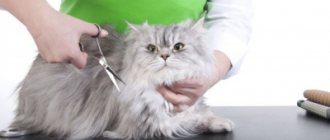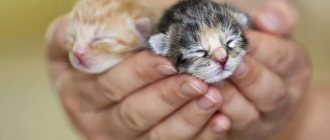Castration is a surgical intervention performed on cats to remove the gonads. The procedure cannot be called mandatory for all pets, but with its help it is possible to eliminate certain behavioral characteristics of the male that appear after the onset of puberty. However, the reason for castration is not always the behavior of the male; sometimes there are medical indications for this. If an animal is injured, has some kind of congenital pathology or some other indication, then castration becomes a mandatory procedure, which is prescribed by a veterinarian when diagnosing the disease. However, most often, pet owners independently express a desire to castrate their cat, since there are no plans for its further reproduction.
There are many myths about the dangers of castration, but most of them are easily refuted by experts. However, as with the need for any other operation, castration has its advantages and disadvantages. If you seek the services of an experienced veterinarian, you can prevent almost any complications.
Is it necessary to neuter a domestic cat?
Suitable age to sterilize a cat
Is castration harmful?
Myths about the dangers of castration
How to care for a cat after surgery
Is it necessary to neuter a domestic cat?
It is advisable to castrate cats that live in apartments and do not go outside. It does not matter what breed they belong to, so the operation can be performed on British, Sphynx, Scottish, Maine Coons, as well as pets without a breed that should not take part in further breeding.
This procedure is mandatory for cryptorchid cats, which, like regular cats, mark territory and are also capable of conceiving, putting their offspring at risk of cryptorchidism. For cryptorchids, there is another reason for surgery. The testis, which is located in the pet’s body and does not descend into the scrotum after birth, sometimes causes tumors and the death of the pet. The veterinarian is responsible for diagnosing cryptorchidism by feeling the body of a six-month-old cat in the groin area.
Castration may not be necessary for pets living in private houses or apartments if they periodically leave them, that is, go outside for a free walk. These animals need to keep themselves in good shape, and surgery can negatively affect their health.
How does castration affect a cat's behavior?
Will castrating a cat affect his behavior? Unambiguous answers or guarantees are inappropriate in this matter. However, the expected changes can be formulated in general terms.
Important! If the cat is neutered at the age of 7–9 months, no significant changes will occur. Your pet will forever remain a kitten in character - playful, curious, sociable, and a little “clingy.”
Will an adult cat's behavior change? The only thing that will change is how exactly this will happen and how quickly there are no answers. You can tell that your cat's hormonal system has begun to come into balance by his sleepiness . For some time, an adult cat will behave as usual... we can say that this happens by inertia. Afterwards there will be a period of drowsiness. To restore the body, you need proper rest, that is, deep sleep. Afterwards, the cat will become more sociable, he will try to sit in your arms more often, and may begin to actively caress. An adult cat will show interest in physical activity, games and toys.
It is important not to miss the moment when the cat starts looking for something to do. It is important for your pet to maintain a daily routine, and it is up to you what he will do in his free time. Will he eat, sleep or spend energy on games. By the way, don’t be surprised if your pet starts coming to sleep in your bed. Since he no longer worries about procreation, he will become more involved in caring for the family he already has.
Suitable age to sterilize a cat
Veterinarians consider the most suitable age for surgical intervention to be between 8 months and 1.2 years. This is the age when the cat has already completed puberty, and it is not difficult for him to undergo anesthesia from the operation. For pets over the age of 5 years, castration is usually prescribed for medical reasons, since in adulthood it is more difficult for the body to cope with anesthesia, and the operation itself in some cases ends in the death of the animal.
It is not recommended to perform surgery before the age of six months. The kitten is in a stage of intensive growth in the period from birth to 6 months, and castration slightly slows down the processes of formation and development of various body systems. This age is considered appropriate, since castration is recommended to be carried out before the male has his first experience with a cat; if he has time to “walk” before the operation, then in the future he will not be able to conceive offspring with a female, but will not stop screaming and demanding a female.
Before the age of six months, surgery cannot be performed, as it can cause the development of the urethra to stop. In the future, this will cause urolithiasis and other health problems for the pet.
If the cat walks alone
Owners of unneutered cats who let them outside feel like they are doing a good deed by letting their pet run around and socialize with other cats.
Such people forget about the many dangers that await a cat on the street:
- cars that can seriously injure or kill an unwary cat;
- flayers and simply cruel people who can kick a pet;
- scattered poisoned dog food that a cat might try;
- various infections, including those dangerous to people;
- hungry packs of dogs;
- fights with other cats, in which the animal may lose an ear or an eye.
In addition, most owners do not want to think about the fact that free-ranging pets reproduce uncontrollably.
Cat owners do not feel involved in the increase in stray animals, because all problems with kittens lie with cat owners, who either get rid of the kittens right away, or let them grow up and throw them away. This exacerbates the problem of homeless animals, and all animal owners who allow animals to roam are guilty of it.
Is castration harmful?
By sterilizing a cat, you can get rid of many problems:
- Plaintive meowing sounds as the pet stops demanding the female;
- Unpleasant odor associated with the cat marking its territory;
- The male will stop showing aggression.
According to statistics, neutered cats live several years longer than ordinary pets. In sterilized pets, the risk of developing cancer of various origins is significantly reduced.
There are several disadvantages to performing this type of surgery. Usually there is a severe course of the postoperative period. When anesthesia is administered, the dog's health noticeably suffers. In addition, there is a high probability of inflammation of the sutures and various bleeding. After the operation, the veterinarian is required to conduct many tests, since it is strictly forbidden to sterilize a pet with health problems. When performing an operation, it is important that everything is done by an experienced veterinarian, which significantly reduces the risk of complications.
After the surgery is completed, cats may begin to rapidly gain weight as they begin to consume food more actively. A castrated cat's weight reaches 12 kg or more. Experts recommend preventing such developments by switching your pet to specialized food for castrated animals. There should be no restrictions on drinking to prevent the development of urolithiasis.
General information
So what is castration? Many (even among veterinarians) believe that this term refers to the surgical removal of the testes (testes). But in reality this is far from the case. Yes, in most cases classical surgical castration is indeed practiced, but still this is far from the only option. There are ways to stop an animal’s sexual activity without surgical removal of organs.
For now, we will consider the arguments for castration, even of an adult animal:
- The pet becomes calmer (however, this does not apply to cases where the cat was overly aggressive before castration).
- The likelihood of cancer of the reproductive system organs is sharply reduced. Of course, with castration at an early age, this rule works much better, but still the chances of cancer are reduced in this case.
- In some cases (chronic orchitis, cystitis, etc.) castration is the only way to keep the cat healthy in the future.
- The animal will no longer run away from home. In veterinary practice, there are cases when breeders began to castrate all their cats after they lost their pets who ran away “on a party” and got hit by a car (or were killed by falling from a balcony).
Myths about the dangers of castration
There are several fairly common myths telling about the dangers and harms of castration:
- After sterilization, a cat suffers from the fact that he does not have sexual contact with females. Many owners believe that they are depriving their cat of all the pleasures associated with mating with cats. However, this does not take into account that for animals this is only the implementation of the basic instinct of reproduction. They do not experience any special pleasure from this that they need for life. An uncastrated pet who is locked in an apartment, unable to fully contact females, suffers much more.
- The pet shows aggression after castration. This statement turns out to be wrong. After such an operation, a domestic cat becomes much more affectionate and flexible. This also applies to those who previously actively showed aggression.
- Neutered cats have a high risk of developing urolithiasis. The reason for the occurrence of such a disease in the case of domestic cats is not that the operation was performed, but due to insufficient water consumption, high protein content in the diet, as well as various infections.
- It is dangerous to castrate a cat, as the risk of complications increases. If the operation was carried out by a qualified specialist, then there will be no serious consequences for the pet.
How does castration affect a cat's health?
The optimal age for castration is considered to be from 7 to 9 months . These limits are due to the fact that the cat has already matured, but has not yet entered into sexual heat. In Europe, the method of early castration (at the age of 2–4 months) is used very successfully. Long-term observations have shown that early castration does not affect the growth or development of either males or females.
At approximately 9 months of age, the cat enters sexual heat, which is accompanied by a hormonal surge. For a few more months the pet will behave tolerantly, after which it will begin to mark and scream. At the same time, the male’s behavior will become defiant and sometimes aggressive. If castration is not performed, the cat will go for walks every month...or more often.
Bursts that occur very frequently will lead to failures. Over time, the cat’s entire hormonal system will be restructured in such a way that only a long period of time can bring it into balance. This is why owners of adult cats suffer from marks and defiant behavior even after their pet is castrated.
If a cat is castrated, he is protected from hormonal imbalances, which increases life expectancy by 3-4 years. Think for yourself:
- The cat will not run away - it will not die at the hands of people, under a car, in a fight.
- The cat will not mate - it will not become infected with sexually transmitted infections.
- The cat will not worry about mating - there will be no stress that depletes the cat’s body and psyche.
- A castrated cat is guaranteed not to get testicular cancer, and this is a very common disease in cats that are constantly walking.
How to care for a cat after surgery
The rehabilitation period for a pet takes several days. This time is enough for the animal’s body to gradually return to normal after surgery. During this time, owners need to pay attention to the condition of the cat.
12 hours before the intervention and the first 24 hours after it, it is forbidden to feed the cat. It is difficult for the animal to endure the recovery period after anesthesia; during this time it may vomit. For this reason, the cat will refuse to eat and drink. Owners are advised to feed the animal liquid food from a syringe without a needle, but only in small portions. This can be done already on the second day after the operation.
Anesthesia can cause strange behavior in your pet in the first 8 hours after castration. The cat may try to hide under the bed or in some other secluded place in the home, so it is important to monitor him and his behavior. When a pet hides, it may not leave its shelter for a long time. During this time, the sutures sometimes become suppurated, and the cat will suffer from exhaustion.
In the first two days, it is necessary to place special diapers under the cat, since this period is often accompanied by uncontrolled work of the bladder and intestines. During this period, the animal's coordination of movement is greatly impaired, so you should not put it on a high bed or sofa.
So, there is no reason to be afraid of castration. Do not hesitate when the question arises about the need for such a procedure. Surgery is one of the effective ways to protect your pet. The only thing that needs to be thought through as carefully as possible is which clinic to go to.
Postoperative period
To quickly restore the cat and prevent complications, it is necessary to follow all the specialist’s recommendations in the two-week period after the intervention. Features of care on the first day depend on how long the anesthesia wears off after castration of the cat. Animals that require castration under general anesthesia require the most attention.
Post-operative care
Upon returning from the clinic, the cat should be placed on a bedding and covered, since as a result of the administration of painkillers, natural thermoregulation is disrupted. Every 20-30 minutes it must be turned over on one side or the other, which will make it possible to prevent numbness and muscle spasms. As cats recover from anesthesia, they may experience unsteadiness on their paws, a staggering gait, and blurred vision. After castration, a cat may behave somewhat strangely: hide, not make contact, or be restless and overly active. During the first few days after castration, this behavior is within normal limits.
If the cat starts to get up, you need to place a tray nearby so that he doesn’t have to go far. Sometimes 1-2 times after surgery, a disoriented animal may wander past the tray or diaper. In this case, you should not scold the cat, since these are just consequences of the operation.
If your cat licks stitches too often or suffers from oral diseases, a special collar may be required in the postoperative period. It will prevent infection and suture dehiscence. How long to wear a collar? The timing is determined by the veterinarian depending on how long the wound takes to heal. It is recommended to bathe the animal no earlier than 2 months after the procedure. If necessary, contaminated areas can be wiped with a damp, well-wrung out sponge.
Proper care in the first days is very important, since the successful outcome of the procedure largely depends on it.
How long does it take to recover from anesthesia?
To correctly assess your pet’s condition, you should know how long it takes for cats to recover from anesthesia. It all depends on the method of pain relief, the characteristics of the body, the drug and the correct calculation of the administered dose.
So, how long does it take for a cat to recover from anesthesia after castration? Sleep usually lasts from 30-40 minutes to 4-5 hours. If a castrated cat does not come to his senses for a long time, you should periodically check his reactions: touch his nose, paws, ears. The cat's attempts to pull his paw or move his ear indicate that there is no reason to worry.
Feeding
Caring for a cat after castration includes a certain drinking and feeding regimen. As soon as the animal wakes up, it needs to moisten its larynx. To do this, a small amount of liquid is poured into the cat’s mouth in small portions, since the swallowing reflex is not restored immediately. A bowl of water is placed when the cat has completely recovered from the effects of the drugs.
Feeding a cat is carried out only if the animal itself shows interest in food. You shouldn't do this by force. Portions should be small, and the volume of food the cat should be increased gradually.
What to feed
What to feed a cat after castration? In the first days, it is worth giving light food: meat or fish puree, dry food pre-soaked in water.
After how long
How long after castration can you feed a cat? Typically, 7-8 hours are enough to recover from anesthesia. You can give food to your cat no earlier than this period.
Complications
All possible complications of castration are divided into those that occur immediately after the procedure and later ones that appear during the healing process. In the first hours after the cat has undergone surgery, it is necessary to monitor its condition. If swelling, wheezing, or a sudden change in temperature or color of the mucous membranes occurs, you should immediately seek medical help. A cat’s poor reaction to anesthesia can result in death if not intervened in a timely manner.
The most common postoperative complications in cats include swelling and hematomas. In such cases, the animal does not go to the toilet for a long time, licks the enlarged scrotum, and shows anxiety. As a rule, blood or lymph that has accumulated in and around the scrotum dissolves on its own after some time.
Castration can cause more dangerous complications in cats: infection of the sutures (accompanied by fever and purulent discharge), damage to the urethra (the cat's urine will contain blood), bleeding and hemorrhages. In order for castration to take place without complications, it is necessary to properly care for your pet and trust it only to a proven, qualified specialist.
How long does it take for a wound to heal after castration? With standard castration, a period of 7 to 10 days is considered the norm.
More details about the operation
There are two types of surgery performed on cats:
- Removal of testicles. The animal is put under anesthesia, after which the surgeon cuts the scrotum and ties the spermatic cord so that there is no loss of blood. Then the testis is cut off with scissors, after which the scrotum is sutured. As a result of the operation, the cat's hormonal levels change and he becomes infertile.
- Vasectomy. In this surgical procedure, the testes remain and continue to function, but the spermatic cord is cut or ligated, which prevents sperm from entering the spermatic duct. The hormonal levels do not change, the cat continues to mark corners and demand a cat, but he can no longer have children.











